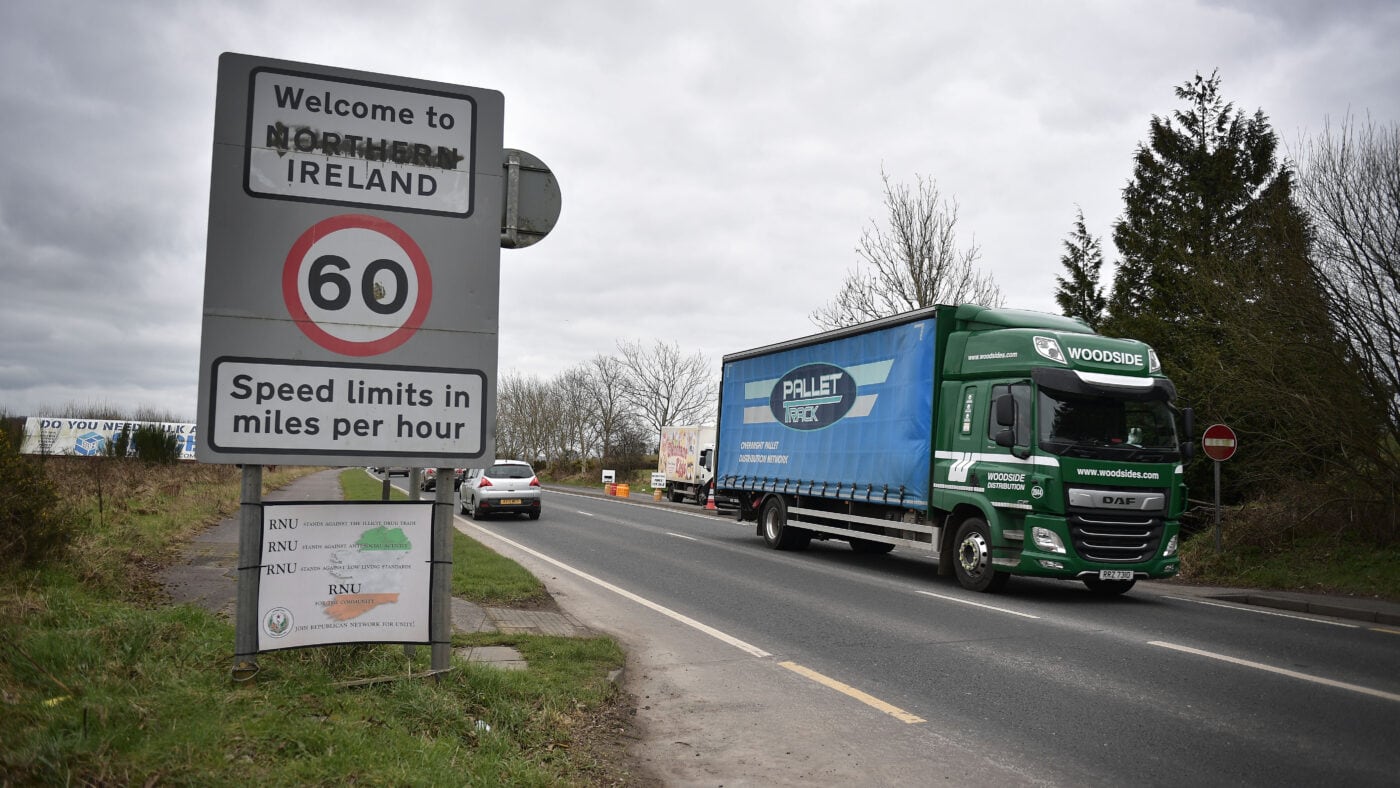On Monday, the High Court in Belfast ruled that the Government’s scheme to send asylum seekers to Rwanda would not apply in Northern Ireland. The judge said that Rishi Sunak’s flagship Illegal Migration Act breached human rights protections enshrined in the Northern Ireland Protocol and Windsor Framework.
The Government is likely to appeal this judgment, but it seemed to confirm unionist fears that immigration and human rights borders are emerging in the Irish Sea, alongside the existing trade frontier. That will have practical consequences, as the province is at risk from becoming a dumping ground for illegal migrants, but it also showed that Rishi Sunak did not deal successfully with the Protocol, despite claiming that the Windsor Framework and his Safeguarding the Union deal with the DUP removed ‘any sense’ of a border in the Irish Sea.
If the court is to be believed, the EU retains authority over vast swathes of life in Northern Ireland and Westminster cannot legislate freely for an integral part of the UK. In contrast, when Safeguarding the Union was published, back in January, the command paper specifically assured unionists that, ‘the Windsor Framework applies only in respect of goods.’ The vast majority of public policy, it said, was, ‘entirely untouched… This includes important areas like immigration, where the UK’s immigration policy and law applies uniformly across the United Kingdom’. According to the Government, the idea that the Framework undermined its Rwanda legislation was simply ‘incorrect’.
Just weeks later, that interpretation started to crumble. The High Court struck down sections of the UK’s Troubles Legacy Act on the basis that they diminished the rights of victims of violence in Northern Ireland. Now, Mr Justice Humphreys, the judge who passed the ruling, has used a similar rationale to ‘disapply’ the Illegal Migration Act in the province.
Article 2 of the Windsor Framework stipulated that there would be no ‘diminution in rights, safeguards or equality of opportunity’ set out in the Belfast (Good Friday) Agreement, as a result of Brexit. In this case, the judge found that the rights of asylum seekers were diluted by the Rwanda scheme, and that it breached aspects of the European Convention of Human Rights, so the Migration Act could not stand. When domestic law clashed with legislation enacting Britain’s withdrawal agreement with Brussels, he claimed the latter must prevail.
In addition, the verdict suggested that Northern Ireland’s human rights law must remain in ‘dynamic alignment’ with that of the EU, including its human rights case law. As a result, the province is likely to diverge further from the legal position in the rest of the UK, so long as Westminster’s approach differs from that of Brussels.
The DUP’s new leader, Gavin Robinson MP, with his ministers again ensconced comfortably in the Stormont Executive, focussed squarely on the threat of a two-tier asylum system and the potential for Northern Ireland to become a ‘magnet’ for illegal migrants. That is certainly a worrying prospect, but it was caused by an automatic pipeline of EU law that his party claimed to have stopped by negotiating Safeguarding the Union.
That document contained a lot of language aimed at comforting unionists. Unfortunately, though, many of the changes it promised have not yet materialised. In a recent interview with the BBC, Mr Robinson conceded that checks on goods would start to be dismantled ‘in the Autumn’, even though action was initially promised in weeks.
The Protocol’s defenders, and some Ulster unionists, have tried to talk down its significance by describing it as merely a ‘trade deal’. The former DUP leader, Sir Jeffrey Donaldson, now awaiting trial for alleged sexual offences, even claimed that a customs border between Great Britain and Northern Ireland would have no constitutional impact.
That was always a nonsensical argument, but it is even more difficult to maintain that immigration is not an important matter of national sovereignty. After all, it was the idea that Britain needed to take back control of its borders that largely persuaded voters to back Brexit.
In January, nevertheless, the DUP decided that it could not remove the Protocol or Framework by continuing to boycott Stormont. That was a defensible conclusion, but by effectively endorsing the Government’s claims to have dealt with the sea border and accepting Safeguarding the Union as a solution, it played its own role in undermining the integrity of the United Kingdom.
When Boris Johnson signed the original Protocol, he thought he could wriggle out of his commitments after the UK left the EU. Subsequently, the government tried to disguise the agreement’s effects and minimise its practical impact, without changing the fundamentals. Indeed, Rishi Sunak’s Windsor Framework, while it claimed to remove the sea border, only entrenched barriers that had not yet been implemented at that point.
This court judgment simply confirms what has long seemed obvious to anyone paying close attention to the Framework saga. For the Union between Great Britain and Northern Ireland, the Protocol is like a wasting disease. It has the potential to eat away steadily at the substance of the province’s place in the UK, and the risk is that eventually there will be little left other than symbolism and money from the Treasury.
This dying government is unlikely to address such a serious and complicated problem in its final months, so it is left with two self-imposed and equally unpalatable options. Either it can attempt to minimise the Irish Sea border, by ditching the Rwanda scheme and other plans that threaten to deepen the sea border. Or, as seems more likely, it can deny the Protocol’s effects and continue with policies that slowly dismantle the Union.
It is only fair to ask, how on earth did an administration that talked repeatedly about its unionism put itself in such an invidious position?
Click here to subscribe to our daily briefing – the best pieces from CapX and across the web.
CapX depends on the generosity of its readers. If you value what we do, please consider making a donation.


